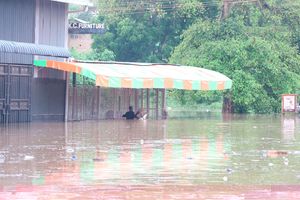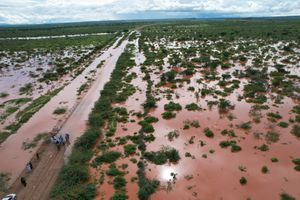Sewage floods homes in Nairobi informal settlement after heavy rains
What you need to know:
- Nairobi County estimates it will spend at least Sh1 billion to mitigate the effects of the El Nino rains.
When the Nation visited Kayole, Amina Wanjiru (60), who has lived in the area for the past 20 years and is currently staying with her five grandchildren, was busy with a small bucket cleaning up the water mixed with raw, untreated sewage that had found its way into her house, as tears of pain, frustration and helplessness ran down her sullen cheeks.
"I am just tired, we have not slept a wink since El Nino arrived, the Nairobi River burst its banks and my grandchildren are coughing endlessly because of cold and illness.

Amina Wanjiru walks on stagnant sewerage mixed with rain water flooding.
"All our bedding gets soaked whenever it rains and this morning I woke up to find my utensils floating in water with faeces because the raw, untreated sewage from the road was swept here," said Amina, adding that she can't move because she can't afford to.
"I have developed chest problems because my bedding is cold and wet due to the El Nino flooding, and we have not been eating well because I cannot cook the little I can afford in this situation."

A man jumps over an overflowing raw sewage drain that flows into the nearby Ngong River in Mugumoini, Kibera on November 22, 2023.
James Kamau (46), who has lived in Kayole since 2002, blames politicians for the failed promises, particularly Embakasi East MP Babu Owino, who he says promised to fix the sewerage system during his election campaign but never visited the area after winning the seat.
"The people who were contracted to build our now dilapidated sewerage systems used very small pipes that cannot serve our ever increasing population and no one seems to care, now that the El Nino rains are here the pipes can no longer hold so they are breaking down releasing all the untreated filth that is being washed into our homes while more filth lies in the open where children play putting them at greater risk.

An impassable road in Soweto, Kayole after a heavy downpour during the ongoing El Nino rains on November 22, 2023.
"Please tell Babu Owino to wake up and fix this mess because we will hold him accountable when the time comes," James told the Nation.
Dennis Maina (30), a youth leader in Kayole, agrees with James.
"Last year, five people we know who lived here with us succumbed to cholera while over 50 were hospitalised, we are afraid of getting sick again and we hope that the Ministry of Health, our area MP and the county government will prioritise our plight.
"Our drinking water in the taps has turned to raw sewage because of the El Nino flooding," said Dennis, stressing that it breaks his heart that their local leaders have left them to live in flooded houses as if they were amphibians.

A flooded vacant house in Soweto, Kayole, after a heavy downpour.
"I have personally called Babu Owino and other leaders about this but I am yet to get any response, I have also called the county government officials who are in charge of the sewerage system and they came here in their truck, looked around and told us there is nothing they can do because they are not able to sort out the mess and now we are wondering if they are not able, who will?" Dennis asked.
There is a heavy downpour as the Nation team arrives in Kibra at Mugumoini where the Ngong River meanders while separating Kibra from Lang'ata, the hopeless, painful and heartbreaking situation is exactly the same as in Kayole, if not worse.
Sarah Atieno (28), a mother of three who recently gave birth to her third child and lives with her husband, watches as the father of her children digs a small trench in the porous walls of their tin-roofed house to drain the water that has been stagnating in their home for the past week.
"The old iron roofs can no longer hold. We have to use ropes to hang sufurias and buckets to collect the water that comes through the roof when it rains.

Some poorly constructed structures are seen next to the Ngong River in Mugumoini, Kibera on 22 November 2023, and are at high risk of being washed away during the ongoing El Nino rains.
"My children are currently being treated for malaria and they cough endlessly, I am tired of living like this because when the rain is extremely heavy, which is almost every night since El Nino arrived, my children, aged between 13 and 8 months, are forced to sleep standing up, how can the first two concentrate in class after such a night? "She poses as she tells the Nation that most of her household items have been washed away by the rains.
"My husband is unemployed and we've never known any other home than Kibra, but after what we've experienced with El Nino, we don't mind being moved to a habitable place."
Sarah's neighbour, John Otieno, with whom she shares a wall, has also dug a small trench and a hole in his house that connects to Sarah's trench, so that whenever his house is flooded, the water first goes to Sarah's house and then finds its way out.

John Otieno at his home near the Ngong River in Mugumoini, Kibera, narrates the challenges he faces after a heavy downpour flooded his house during the ongoing El Nino rains.
Even more devastating is how John sleeps, as he has collected a huge pile of large stones and made a sort of structure that looks like an altar, and then placed his bedding on top of it?
"I had to do this so that the water would not get my bedding wet, and even more so because I love my beauty sleep, but nowadays I have learnt that there is nothing beautiful about sleeping for me because of the fear that I might be swept away while I sleep.
I also wake up when my back is very sore and painful, I have seen friends in the same predicament as I am using the cement slabs that are usually in the city that we walk on and cover the sewerage system to raise their bedding so that when the floods come they don't get to them but that is vandalism because Kenyans walk on those slabs every day," John tells the Nation while stressing that he is ready and willing to be relocated to safer ground.
"We are not in this predicament by choice, it is where life has brought us and if we could afford to be somewhere else in a warm bed, we would be there, but like me, I live by my own means and I can't afford that."
In a recent interview with the Nation, Bramwel Simiyu, the chairman of the Nairobi County El Nino Task Force, said they had identified alternative shelters for those living on riverine land and vulnerable to flooding, namely churches and social halls such as Joseph Kang'ethe Hall in Kibra, where they would be accommodated.
"We will provide food, tents, blankets and dignity pads to all those affected," he said at the time.
Speaking to the Nation on Thursday, Mr Simiyu said they were carrying out assessments and would soon relocate with the Red Cross and other partners.
"We have marked the water levels on the banks along the riverbanks in Nairobi and we have a team on the ground right now doing the assessment, we are also just waiting to go to the alert stage as directed by the Kenya Meteorological Department," Mr Simiyu told the Nation in a telephone interview.
Nairobi County estimates it will spend at least Sh1 billion to mitigate the effects of the El Nino rains.





